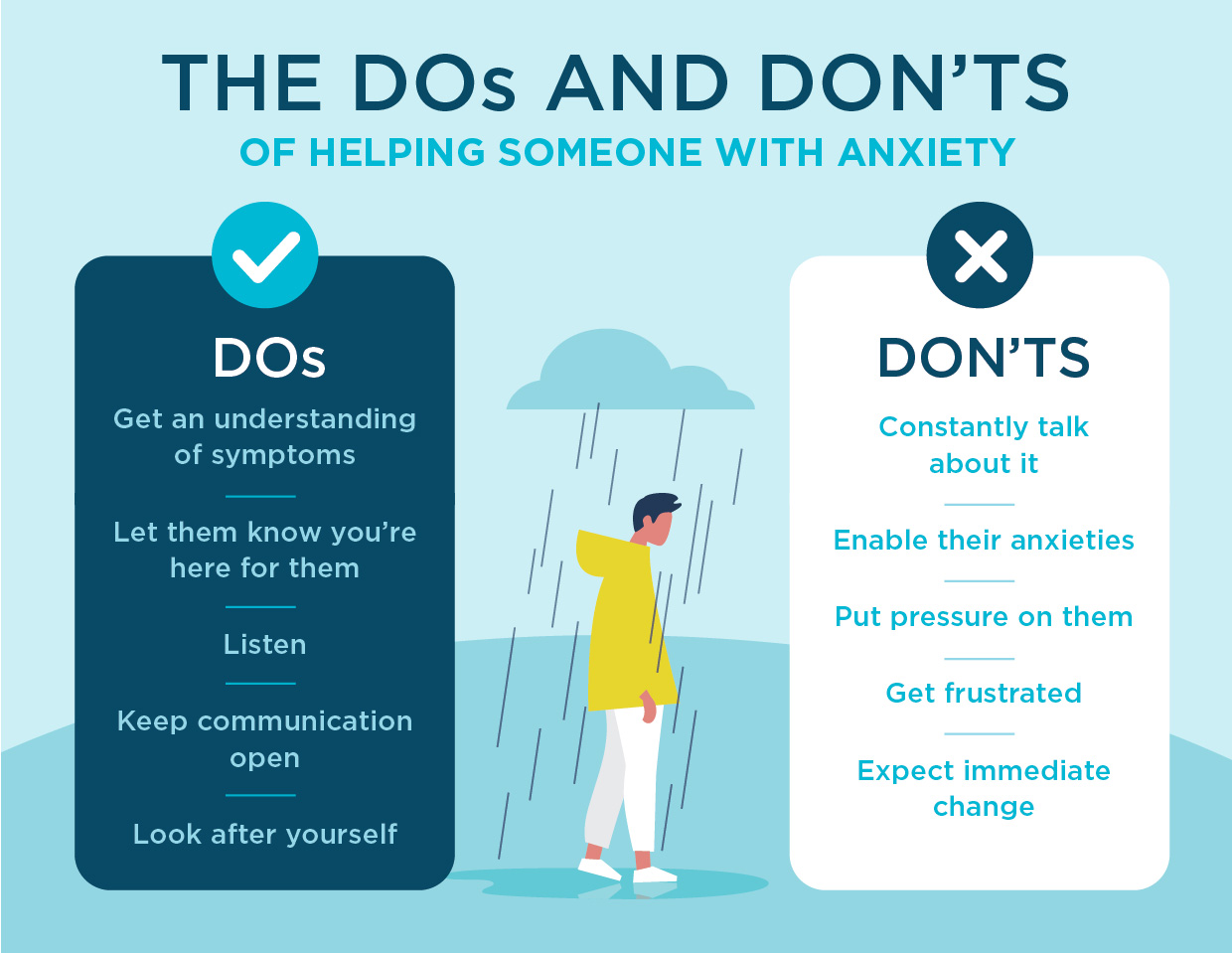How to help someone with anxiety
Supporting someone with anxiety can be challenging, but understanding how to help them is crucial for their wellbeing.
Supporting someone with anxiety can be challenging, but understanding how to help them is crucial for their wellbeing.


![Renju-Joseph-360x246px].jpg](/media/1jsdkuqi/renju-joseph-360x246px-jpg.jpg)
If someone in your family or one of your friends has been experiencing anxiety or has been diagnosed with an anxiety disorder, you'll want to know the best ways to support them.
Mental health conditions can sometimes be tricky to manage, but when it comes to supporting someone with anxiety, we have outlined some useful 'dos' and 'don’ts' to help you to support them in the most effective way.

Anxiety impacts people differently. There's a wide range of anxiety symptoms and people can exhibit different behaviours, including defensiveness, irritability and restlessness.
Reading up on anxiety types and their different symptoms can help you get a good understanding of what the person you care about is going through. This can help you to empathise with their experience and identify times when they may need more support.
When learning how to help someone with anxiety, you may want to explain to the person that you’ve noticed that they seem more anxious lately and that you want to help.
This will typically come as a welcome relief to the person, as they realise they don’t have to carry the burden of their anxiety alone. Having this conversation gives the person a chance to see that they have people who care about them, who want to listen and who want them to feel better.
When you ask the person how you can support them, listen carefully to their preferences. They may want help breaking down a task they are anxious about, they may want you to distract them from their anxious thoughts or they may just want someone to talk to.
By taking the time to listen and understand their needs, you can give them emotional support that will really make a difference.
When it comes to helping someone with anxiety, it's important to keep an open line of communication with them.
If you're able to, see the person regularly as this will help with managing anxiety. Spend one-on-one time with them so they have opportunities to talk about anything they feel anxious about. You can also keep in touch over the phone - you could video or phone call them once a week, or send a text every few days to see how their week is going.
When you offer to help with anxiety, it's understandable for you to feel frustrated, scared or tired from time-to-time. It's likely that the person's anxieties are having an effect on you too.
Make sure you’re dealing with your own emotions and maintaining your wellbeing. Talk to other friends or family members about how you're feeling, think about accessing therapeutic support, take care of your physical and mental health, and book in time every week to do activities you enjoy. By keeping yourself well, you'll be in a much better position to help the person with anxiety.
And always remember, you’re doing your best.
If your loved one feels comfortable discussing their anxiety, use active listening techniques to show you understand how they feel and that it makes sense.
There are things you should try and avoid saying too. In general, try not to minimise how someone feels or dismiss what they're saying as an overreaction.
When you're with the person, or when you're talking to them over the phone, avoid constantly bringing up their anxiety or asking questions about it. Instead, keep the conversation flowing and let them talk about it if they want to. That way, they won’t feel uncomfortable and pressured into discussing their anxiety when they don’t want to.
When someone has anxiety, they might try to avoid certain places or scenarios. As a result, you might have started to modify your behaviour as well. For example, you might avoid certain places or scenarios too, or take on tasks to help the person continue with their avoidance.
We understand that this may seem helpful as you're stopping the person from worrying in the short term, but this avoidance can actually have a negative impact on them in the long run. Their continued avoidance can perpetuate their worries and prevent them from recognising that they could actually manage in the scenarios they're avoiding.
While it's important that you don't enable their behaviours, it's also important that you don’t force the person to go to places or enter scenarios that they're extremely anxious about.
This is something they should work towards graudally with professional therapeutic support. If you attempt to push them too far, it could damage the trust in your relationship and cause them a significant amount of stress.
Part of suffering from severe levels of anxiety can be a lack of willingness to engage in your hobbies, job, or social activities. Remember, if your loved one cuts themselves off from social activities or friends and family, it's their defence mechanism kicking in.
Don't take it personally and don't get frustrated if they aren't as engaged as you.
Recovery is a process. Over time, your loved one will develop strategies and techniques that help them deal with their anxiety, and slowly return to normal life. Do everything you can to support, and not hinder, this process by being patient.
Mental health doesn't change overnight. The issues that led to a deterioration in their state of mind are likely to be complex and will take time to heal. Take this into consideration if you ever feel frustrated at what you perceive as a lack of progress. Give it time and it will come.
If you would like to find out more about our dementia care homes, which offer long term stays and respite services, please make an enquiry online or call us today.
